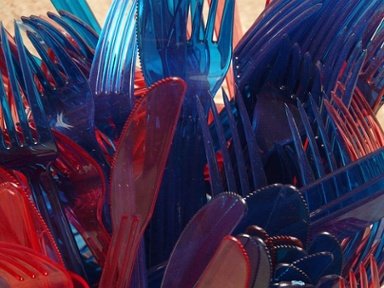 While biodegradable forks and spoons already exist on store shelves, consumers often opt for more cost-effective, petroleum-based alternatives. However, this month IBM Research have announced that scientists have identified a chemical catalyst that can be used to create cheaper, biodegradable plastics from plants such as palm trees and beets. These inexpensive plastics can be used for making common consumer plasticware, such as eating utensils, as well as medical devices.
While biodegradable forks and spoons already exist on store shelves, consumers often opt for more cost-effective, petroleum-based alternatives. However, this month IBM Research have announced that scientists have identified a chemical catalyst that can be used to create cheaper, biodegradable plastics from plants such as palm trees and beets. These inexpensive plastics can be used for making common consumer plasticware, such as eating utensils, as well as medical devices.
“What’s exciting about this discovery is that we now have a cheaper way to convert plants into common consumer plastics that decompose over time, providing an alternative to recycling plastics,” saidGavin O. Jones, computational chemist, IBM Research Almaden,San Jose, Calif.”Making biodegradable plastics mainstream means less impact on our solid waste systems.”
The current method to convert plants into biodegradable plastics imparts heavy metals into the process. While used in small amounts, these heavy metals are difficult to remove, remain in the material and do not decompose over time. The new catalyst is an organic substance that lowers the energy required for the conversion from plant to plastic to occur. It does not contain heavy metals and can thus degrade in the environment over time just like the plastic itself.
“In this study, we used a combination of predictive modelling and experimental lab work to make the discovery,” saidXiangyi Zhang, graduate student working with Dr.Robert Waymouth, Department of Chemistry,Stanford University. “This tag-team approach takes a lot of the guess work out of the process and helps us accelerate the materials discovery process.”
The learning from these research efforts can also be used to advance cognitive systems. The scale, pace and complexity of materials science is a challenge for scientists working to discover new materials. As part of the IBM Research (@IBMResearch)Frontiers Institute, scientists are combining expertise in informatics and polymers, and other materials, to prototype systems to extract, organize, analyze, and predict insights from materials datasets. By leveraging existing knowledge from the world’s scientific databases and accelerating computations used in these types of experiments, these cognitive tools could help identify patterns and to bring new discoveries to realization faster.
Thestudywas published inNature Chemistryunder a long-standing collaboration withStanford University’sDepartment of Chemistry and funded in part by the National Science Foundation.
IBM Research Almaden is also the birthplace of several recent plastics and recycling achievements including the discoveries of: a new process to recycle plastics intonanofibersdesigned to specifically target and attack fungal infections, an entirelynew class of plastics, a new plasticmacromoleculethat could help prevent deadly virus infections and a new method forrecycling CDsinto non-toxic plastics for water purification and medicine.
For more stories on bio-based industry developments like this…
15 key recommendations for your bio-based business in 2016.





